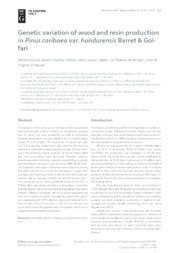Genetic variation of wood and resin production in Pinus caribaea var. hondurensis Barret & Golfari.
Genetic variation of wood and resin production in Pinus caribaea var. hondurensis Barret & Golfari.
Author(s): SANTOS, W. dos; SOUZA, D. C. L.; MORAES, M. L. T. de; AGUIAR, A. V. de
Summary: The purpose of this work was to estimate genetic parameters and selection gain of Pinus caribaea var. hondurensis progeny trial for wood and resin production as well as correlation between them. Experiment was established in complete lattice square 10 x 10 (triple), 100 treatments, 10 plants per plot, 3 m x 3 m spacing. Twelve years after planting the trial had thinned considerably leaving six plants per plot. Twenty-seven years after planting height, diameter at breast height (dbh) and resin production were measured. Deviance analysis, genetic parameter estimates, selection expected gain, genetic and phenotypic correlation were based on REML/BLUP method. Significant phenotypic differences were observed among and within families for all traits. The thinning at 12 years after planting, contributed positively to dbh increase and resin production, with an average of 30.60 cm and 4.83 kg tree-1year-1. The individual narrow sense heritability ranged from 0.25 to 0.38 for dbh and volume. Genetic and phenotypic correlation between growth traits were positive, and significant. Therefore, different selection strategies will be proposed separately for both traits (resin and wood). The selection gains were significant, especially with 10 % selection intensity (individual selection) for dbh (7.53 %) and resin (13.49 %). The trial has had good performance for growth, resin and genetic variability to support the next breeding generation.
Publication year: 2016
Types of publication: Journal article
Unit: Embrapa Forestry
Observation
Some of Embrapa's publications are published as ePub files. To read them, use or download one of the following free software options to your computer or mobile device. Android: Google Play Books; IOS: iBooks; Windows and Linux: Calibre.
Access other publications
Access the Agricultural Research Database (BDPA) to consult Embrapa's full library collection and records.
Visit Embrapa Bookstore to purchase books and other publications sold by Embrapa.

